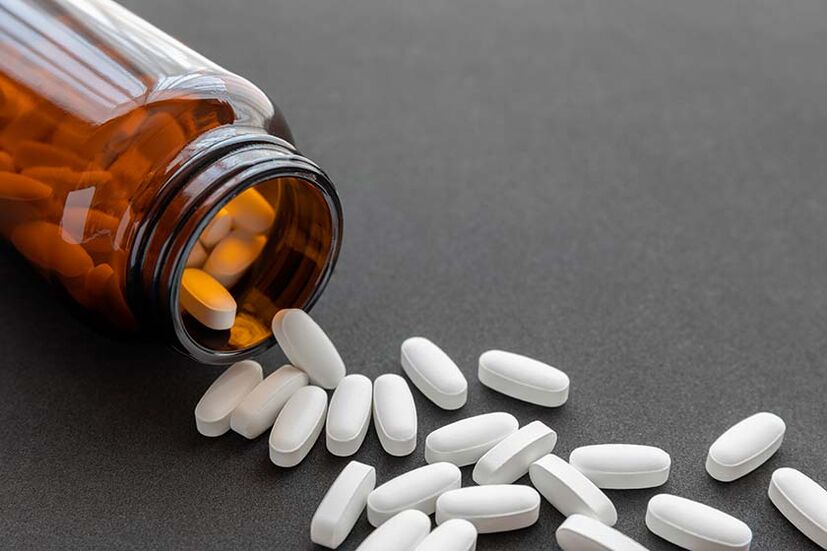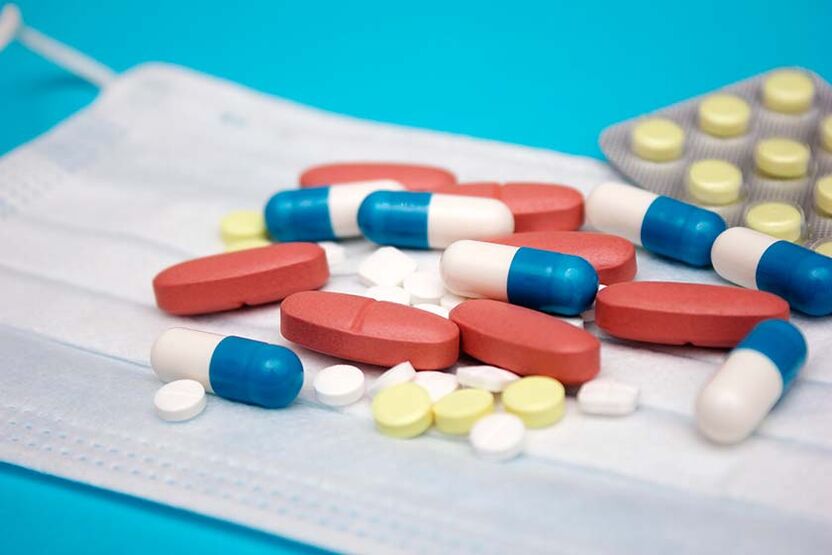Scientists do not agree whether alcohol is compatible with antibacterial drugs.Some experts suggest that drinking alcohol after completion of treatment does not lead to a deterioration of health.There are many more opponents of this approach among doctors.
Denal Drinking During and After Treatment: What Experts Say
The composition of antibacterial drugs includes synthetic substances that destroy viral microorganisms.They are prescribed when ordinary medicines are useless.On the one hand, antibacterial drugs help to cure people from very serious discomfort.On the other hand, the drugs of this group have high toxicity.It is not for no reason for doctors to recommend drinking hepatoprotectors during treatment to hold the liver.
Alcohol after antibiotics significantly increases the load on the body.Whether to use alcohol during antibiotic treatment, the question is open.
Experts identify several reasons why you should refuse to drink during therapy:
- Alcohol levels the effect of medication.The active substances of antibiotics interact with the proteins of microorganism, affecting them, changing the structure.Alcohol molecules change proteins, weaken chemical bonds.
- The liver experiences heavy loads during treatment with any medicines.If a person drinks, he creates extra stress for the body.As a result, toxic hepatitis, intrahepatic cholestasis develops, bile leakage is difficult, the inflammatory process develops in the bile ducts and liver.
- The interaction of alcohol with antibiotics can cause a significant deterioration of good behavior.Disulfiram -like reactions are accompanied by fever, nausea, headache, and in the least, they can lead to coma and death.Medicines in this group are used in the treatment of alcoholism.
Alcoholic beverages contain substances that contribute to too fast absorption of medicines in the intestine and further eliminate them.
How long after the course of antibiotics can you drink alcohol?The term depends on the drug and duration of the course of therapy.Some types of antifungal drugs, as well as penicillin, heliomycin are compatible with strong drinks in small doses.In order to avoid unpleasant consequences, it is advisable to completely abandon them or consult a doctor.The combination of alcohol and antibacterial drugs should be in exceptional cases.
3-5 days after the end of antibiotics, doctors allow drinking alcohol.This time it is sufficient for toxic substances to eliminate the body and it can respond adequately to alcohol.If the patient suffers from chronic forms of diseases and repeatedly resorts to treatment with antibacterial drugs, from alcohol intake, you should refrain from 2-4 weeks.

Alcohol after antibiotics: prospects and consequences
The view that absolute alcohol is incompatible with any medicines, there are no clinically confirmed facts.This is a myth.There are separate types of therapy during which doctors recommend that alcohol be excluded.The consequences of use are not necessarily fatal, but the prospect of developing possible complications is great.
The table below shows examples of negative alcohol reactions from the body.It should be noted that an unpredictable situation can develop in response to the use of completely "harmless" medicines.To find out how much you can drink alcohol after antibiotics, you can have your doctor before taking medicines.
| Medicines | The result of a combination with alcohol |
| Aspirin | Gastric ulcer |
| Caffeine, ephedrine. | Hypertension |
| Diuretic, hypotensive. | A sharp reduction in pressure |
| Paracetamol | Toxic damage to the liver |
| Insulin, medicines that lower sugar levels. | Falling sugar in the blood, coma |
| Neuroleptics, painkillers, anti -inflammatory | Poisoning. |
| Tranquilizers, sleeping pills | Neoxy, coma |
| Sulfamylamides | Lack of effect, intolerance to individual substances. |
| Niprolzerine, antihistamines | Allergy, increased pain |
Cefocetan group preparations delay the chemical reaction to the division of alcoholic molecules.As a result, one experiences all signs of poisoning: dizziness, vomiting, headache, shortness of breath.Disulfir is a high content of anti -alcohol components used in a drug to treat addiction.The smallest dose of alcohol is significantly deteriorating well.The minimum abstinence from the use of strong drinks is a week.
Another medicine, poorly combined with alcohol - metronidosol.Alcohol after this antibiotic leads to intoxication.However, this decision has not been scientifically confirmed.In 2003, medical scientists conducted an experiment.A small group of Finns were asked to drink alcohol regularly during metronisol treatment and then share the result.5 days after the start of antibiotic administration, it turned out that it had no negative effect on alcohol.The study organizers stressed that in order to avoid negative effects, you should not combine strong drinks with metronidazole.
There are several other groups of medicines that cannot be combined with alcohol:
- Tinedezole;
- Linesolide;
- Erythromycin;
- Sodium thiosulfate;
- Methadoxin;
- Cyanamide;
- Calcium carbimide;
- Disulfite;
- Lithium nicotinat;
- Naltrexon;
- Dimerkaprol;
- Nalmefen.
Doctors immediately warn patients about the danger and effects of combining antibacterial drugs with alcohol.
The point is that then how much alcohol is possible after antibiotics are interested in many citizens.I would like to use strong drinks without fear.These fears are not in vain.
The result of combining an antibiotic drink:
- The transition of the disease to a chronic form.Microorganisms become resistant to a particular substance, the effect of therapy disappears.The treatment process slows down.
- Worsening of blood counts.An increase in coagulation leads to the development of cardiovascular pathologies.The risk of stroke or heart attack increases many times.
- The occurrence of allergic reactions.A slight attack is stopped by antihistamines.In severe form, anaphylactic shock and swelling of Quincke develop.
Find out how much you can drink alcohol after antibiotics, you can consult a doctor.
Compatible drugs
Doctors allow a combination of strong drinks with certain types of antibacterial drugs.List of "Safe" antibiotics:
- cephalosporins;
- penicillin preparations;
- Macrolides.
A patient taking penicillin medication should refrain from drinking 4-5 hours after the end of the course.During this time, the active substances of the drug dissolve and disintegrate.The breakdown products are separated through the excretory system.
Approach
Researchers have conducted a survey of the population of England.Of the 300 patients, the clinic over 80% believe that the drink has a negative effect on the effect of medicines, 71% fear the effects of such a combination.
The truth is that the biggest danger lies in the formation of resistance to the drug.Microorganisms become resistant when there is an unsystematic medicine.The patient, drunk, is afraid of the consequences, so he refuses to continue the course of treatment.
Why can't you drink alcohol during treatment with antibacterial drugs?Systematic abuse of beverages in combination with serious medicines can lead to a malfunction of the organs until their refusal.Systematic drink impairs immunity, so the risk of developing various pathologies is increased.

Body Restoration: Recommendations
How long after drinking alcohol is it necessary to recover after an antibiotic?What is the deadline for growing a particular medicine, a doctor can say.Depending on the type of antibacterial drug, this period may be stretched for several days.An important criterion is the duration of the course.The longer the treatment, the more time it takes for rehabilitation.
Doctors do not allow them to drink alcohol after antibiotics in several cases:
- The presence of diseases that occur in a chronic form in which the liver experiences a toxic load.
- At the same time taking other medicines.The recovery period in this case is delayed for up to 6 months.
Experts say: The complete rehabilitation of the body after an antibiotic course takes 1 year.At that time, a person significantly increases the risk of colds, flu and other infectious diseases.
The chiva is experiencing a large load during medication.Digestion is impaired, metabolism slows down, vitamins are poorly absorbed, allergic reactions are exacerbated.
Experts agree that you can drink alcohol after antibiotics not earlier than a few weeks after discontinuation of therapy.In some cases, it is recommended to reduce drinking to a minimum.
You can help your body normally by drinking a course of probiotics.They are rich in bifido and lactobacilli, vitamins, amino acids, enzymes.Probiotics drink during or after the end of treatment for 2-3 weeks.
The benefits of the product:
- reduction of toxic load on the liver and kidneys;
- strengthening immunity;
- Restoration of the balance of the intestinal microflora (local immunity);
- normalization of the digestive process;
- blocking of toxins and allergens;
- Improve the assimilation of vitamins.
In case of disruption of the course of antibiotic treatment, the risk of resistance increases.
Alcohol after antibiotics: How long can you alcohol
The excretion time of certain antibiotics is individual.The blood system and vessels are released from aminoglycosides within 3 hours.The unhappy remains of medicines located in the internal -finished fluid leave the body after 2 weeks.Uncontrolled use of strong drinks before this period can lead to absolute deafness.
If the use of medicines has been repeatedly, then doctors recommend that you wait for the use of strong drinks.This applies to all drug groups.You cannot drink alcohol after antibiotics on the same day or within a few hours after treatment.
Drinks belonging to the category of lightweight alcohol (beer, wine) are allowed to drink 3-5 days after the end of treatment.With a stronger alcohol it is necessary to delay.Doctors advise you to wait 10-12 days.The reluctance to follow leads to negative effects to the death of the patient.























